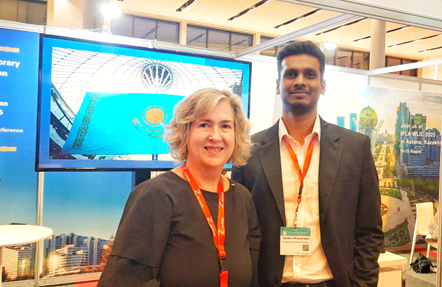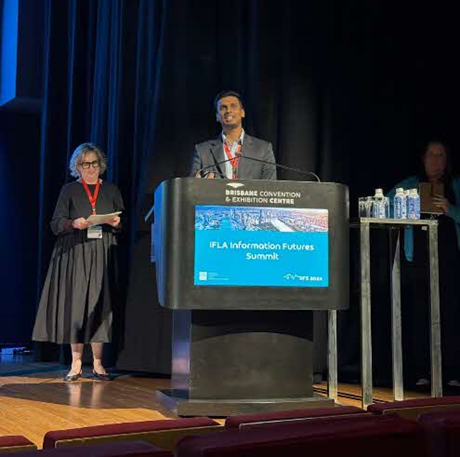An IFLA Emerging Leader’s Personal Reflections on the IFLA Information Futures Summit 2024
30 November 2024
A dream come true…
Participating in the IFLA Information Futures Summit 2024, held in Brisbane, Queensland, Australia, in early October was a wonderful and unforgettable experience for me. Attending an IFLA conference has always been one of my dreams, but I never expected to be selected as an IFLA Emerging Leader grantee. In this article, I will share my experiences and ideas from the summit from my personal point of view.
The summit was meticulously organised, bringing together leading experts, speakers, and practitioners in the fields of library, information management, technology, and other related fields to discuss the future of library and information services in a rapidly evolving digital information landscape. Having a keen interest on how emerging technologies will shape the future of libraries and information centres, I eagerly immersed myself in these discussions, which broadened my insights and perspectives immensely.

What the summit made me think about
There were many mind-expanding discussions held during the Summit. Engaging in them created a sense of an information “superglut” in my mind. I felt that all organisations, including libraries, are engulfed by the AI storm and do not know which way it would blow in the future. This rapidly growing technological advancement cannot be ignored. When we look back at history, we see that libraries have been very versatile and have adapted to novel technological trends. They readily embraced these changes and enhanced their services. Hence, libraries will hopefully adopt this newly emerging AI and accommodate it in the right form, place and proportion. The summit made me realise that, even with the most advanced technologies, libraries are human-centric, and that libraries will be f use to humans as long as humanity exists. Their form may be entirely different in the future, but their function will remain the same. As Prof. Marek Kowalkiewicz noted in his keynote, we will have to bring a human touch into this advanced technology.
Applying Knowledge to Work
As an emerging leader, I applied the experiences I have gained through the Summit by sharing with my immediate coworkers and friends in my master’s class. I summarised keynote speeches and directed them to recorded videos. Going beyond just sharing the knowledge with others, I plan to practically apply the new concepts at my workplace.
One of the key ideas I took away from the Summit is the applicability of Generative AI to innovate and enhance the library services. Initially this may be an AI-driven reference service or an AI-driven library assistant to help users. The users can obtain personalised services with smart recommendations based on user history, reading patterns, interests, etc.
The other important concept that I am going to apply is focusing on community building within my workplace. Libraries have a huge responsibility to keep humans in the loop in this transformed environment. As a starting step, establishing a reader’s club or an online book club among students will be a good solution. Another important aspect which I always keep in mind is to design patron-centric services and to always be neutral and unbiased as much as possible when working with users. The Summit taught me the importance of the quality of this service, and I am going to try my best to continuously enhance user-friendly services.
Galleries, Libraries, Archives and Museums (GLAM) in Queensland
I must also note my admiration for the GLAM in Queensland. On the self-guided library tour, I managed to visit five libraries, four galleries, and two museums. Two things really stood out to me during the visits Firstly, I was impressed by how modern technology is aptly incorporated into these cultural heritage centers. I believe that in the future, they will be able to provide even more enhanced user-experiences with the help of AI.
Secondly, I noticed the interconnection between these institutions. There was a library vibe in the galleries and a sense of gallery atmosphere in the libraries. Some of the exhibits in the galleries seemed as if they digitally preserved not only the landmarks but also the environmental conditions around them. Sitting there watching the screen, I felt as if I was actually in that place itself. In addition, it was noteworthy that libraries in Brisbane took every detail, from the interiors to the exterior landscape, into account to serve their patrons’ needs.
Conclusion
It was a memorable experience to have the opportunity to exchange ideas with other library professionals all over the world during breaks in between the sessions. This networking experience was invaluable, as it allowed me to gain new knowledge and build connections with peers who have a similar passion for the future development of libraries.

Having a chance to wrap up the key points of the second day of the Summit for the international audience was also a great personal opportunity. It helped to build up my confidence in public speaking.

Attending the IFLA Information Futures Summit was not only a professional milestone for me but also a source of personal inspiration. As I return to my work, I feel energised by the possibilities that lie ahead and excited to bring these new concepts into practice. The summit exposed me to the future evolution of libraries and information services and spurred my enthusiasm to be a part of this exciting transformation. Finally, I’m deeply thankful and grateful to IFLA and the IIFS organising committee for giving me this incredible opportunity. I extend my thanks to all the other emerging leaders for their support and friendship. Together, we are stronger!
Contributed by Sandun Weerasinghe, Library Executive, Sri Lanka Institute of Information Technology (SLIIT)